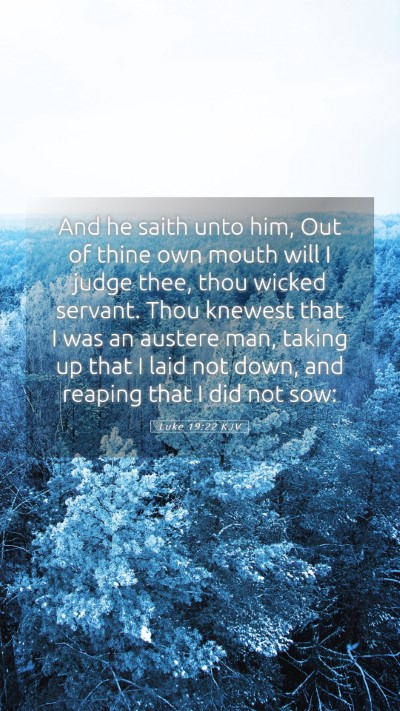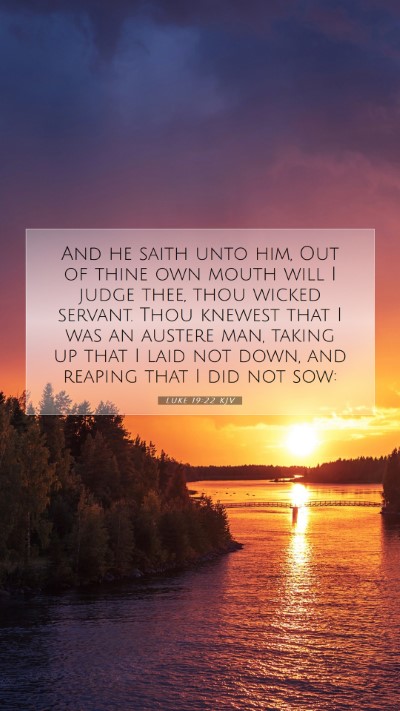Bible Verse Meaning: Luke 19:22
Verse: "And he said unto him, Out of thine own mouth will I judge thee, thou wicked servant. Thou knewest that I was an austere man, taking up that I laid not down, and reaping that I did not sow." (Luke 19:22)
Overview of the Context
In this passage, Jesus uses the parable of the pounds to illustrate the principle of responsibility and the consequences of one's actions. The role of the nobleman (representing Jesus) signifies authority and the expectations placed upon His servants (the followers). The servant’s failure to act on his master’s behalf serves as a cautionary tale regarding spiritual diligence.
Detailed Analysis
This verse is critical in understanding the servant's judgment. Below, we outline the interpretations and explanations from notable public domain commentaries.
Matthew Henry's Commentary
- Judgment from Knowledge: Henry emphasizes that the servant was judged based on his own acknowledgment of the master’s nature. This suggests that those who know the requirements of God have greater accountability.
- Austere Character of the Master: The master's austere nature highlights God’s righteous expectations. The servant's inaction reveals a willful neglect in understanding the seriousness of his duty.
- Wickedness Defined: The term "wicked" here underlines the idea of moral failure due to lack of effort and responsibility.
Albert Barnes' Commentary
- Self-Incrimination: Barnes notes the irony that the servant condemns himself by acknowledging the master's strictness. He suggests that recognition of wrongdoing leads to greater culpability.
- Divine Expectation: The verse serves to highlight that knowledge of God’s nature places heavy expectations upon believers and calls for active engagement in faith.
- Consequences of Inaction: Barnes stresses that failure to act on what one knows regarding God leads to severe consequences, further emphasizing the seriousness of spiritual stewardship.
Adam Clarke's Commentary
- Reflection on Character: Clarke interprets the master's indictment as a necessary personal reflection. The servant's perception of the master as harsh suggests an unwillingness to serve effectively.
- Servant’s Failure: In Clarke’s analysis, the servant’s laziness and failure to act can be representative of many who hear the word yet take no initiative.
- Application to Believers: Clarke brings forward the application of the verse to modern believers, emphasizing that they are obligated to use their gifts and opportunities wisely.
Implications for Believers
Luke 19:22 serves as a profound message for all followers of Christ. It speaks to anyone searching for bible verse meanings and highlights the principles of:
- Accountability: Believers are called to act according to their understanding of God's will.
- Responsibility: Each person has unique gifts and resources to manage in service of God.
- Self-examination: Individuals should critically assess their actions and inactions in light of their knowledge of Scripture.
Cross References
This verse relates to several other passages that enhance its meaning:
- Matthew 25:14-30 - The parable of the talents discusses similar themes of stewardship.
- James 4:17 - Asserts that knowing the good one ought to do and failing to do it is sin.
- Luke 12:48 - Discusses the principle that to whom much is given, much will be required.
Final Thoughts
The explanation of Luke 19:22 emphasizes that understanding Scripture is essential for growth in faith. For those involved in bible study groups or seeking online bible study opportunities, reflecting on this verse can lead to deeper insights into the nature of God and individual responsibilities. The parable calls for an active engagement with the teachings of Jesus, encouraging believers to wisely invest their spiritual resources.


